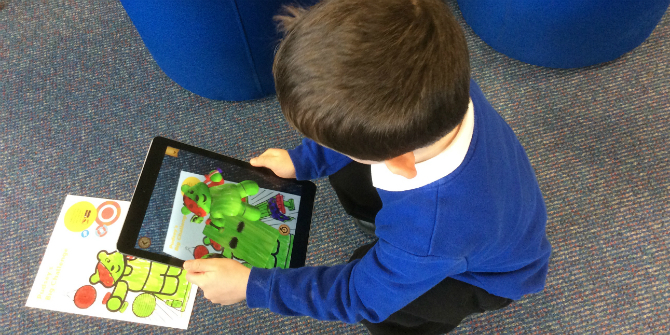 Children rely on digital technologies to stay in touch with friends and family but this has recently become even more prominent in a context of social isolation, homeschooling and prolonged lockdowns. Faced with few alternatives, parents are concerned about how spending time on social media platforms might affect their children. In this blog, Gianfranco Polizzi discusses the findings from a new survey with parents of children aged 13-17 showing that the majority of parents (83%) expect social media companies to be responsible for ensuring children’s safe internet use. Parents worry that tech companies prioritise profit ahead of promoting positive outcomes for children (73%), revealing the need for a unified effort by governments, industry, educators and parents to ensure children’s positive engagement with digital technologies.
Children rely on digital technologies to stay in touch with friends and family but this has recently become even more prominent in a context of social isolation, homeschooling and prolonged lockdowns. Faced with few alternatives, parents are concerned about how spending time on social media platforms might affect their children. In this blog, Gianfranco Polizzi discusses the findings from a new survey with parents of children aged 13-17 showing that the majority of parents (83%) expect social media companies to be responsible for ensuring children’s safe internet use. Parents worry that tech companies prioritise profit ahead of promoting positive outcomes for children (73%), revealing the need for a unified effort by governments, industry, educators and parents to ensure children’s positive engagement with digital technologies.
Less than a year ago, Netflix released a documentary titled the Social Dilemma. While this documentary was challenged by Facebook for being too sensationalist, it raises legitimate questions about the impact of social media platforms on humanity. Undoubtedly, the internet can be a force for good as it enables users to benefit from opportunities for learning, for entertainment, for keeping touch with relatives and friends, and, among others, for participating in public debate. At the same time, though, it also contributes to risks that include, for instance, forms of online abuse, issue of privacy and financial safety, misinformation and the polarisation of public debate.
In the last few years, we have witnessed how detrimental these risks can be for society, as exemplified by the degree to which both misinformation and polarisation have become rampant online during key political elections. This is problematic because democracy must rely on a well-informed citizenry. But what is even more alarming is that many online risks, including online misinformation and polarisation, are exacerbated by the ways in which internet and social media companies operate. On the one hand, the extent to which these companies self-regulate online content has been criticised for failing to curb the spread of hate speech on their platforms. On the other hand, their use of algorithms to collect and track users’ data for adverting purposes has been called into question. The problem is that their algorithms personalise online content by exposing users to information that, irrespective of its accuracy, reinforces their pre-existing beliefs. Issues of surveillance and data breach, furthermore, have become typical of the digital age, with companies like Cambridge Analytica harvesting illegally millions of users’ data on Facebook for political microtargeting.
The Netflix documentary the Social Dilemma captures the extent to which we, as a society, are faced with an ethical dilemma: to accept how the digital environment operates or, hopefully, to find ways to re-imagine, re-design and regulate it in ways that can enable us to tackle online risks while taking advantage of online opportunities.
A call for a better regulation of the digital environment
The latest survey conducted by Yonder and commissioned by the Jubilee Centre for Character and Virtues at the University of Birmingham found that most UK parents of children aged 13-17 think that the digital environment needs to be better managed in order to contribute to, rather than undermine, human flourishing – i.e., our ability to live well and thrive collectively. Collecting responses from 1,515 parents in the UK, the survey focused on questions about the role and responsibilities, in terms of promoting internet safety, of parents themselves, the education system, tech companies and the government.
Key findings include:
- Almost half of parents (48%) think that internet and social media companies contribute more to online risks than to opportunities.
- 80% of parents think that search engines and online platforms should be redesigned to enable users to stay safe online.
- Only 22% of parents trust internet and social media companies to self-regulate the digital environment. By contrast, almost 80% think that the government should make more efforts to tackle online risks.
- 69% of parents think that the government has a responsibility to appoint an independent body to regulate online content.
In addition:
- Parents are most concerned that their children are at risk of being exposed to violent, hateful or racist content or activities that show a lack of compassion and respect for others, with more than half (51%) choosing this, out of many online risks, as one of their top three concerns.
- The quality that parents most want their children to show online is the ability to make wise decisions online, with 56% of parents choosing this as one of their two top qualities.
- 77% of parents think that schools should make more efforts to teach about good character, wisdom and virtues in relation to the internet.
A unified effort to re-imagine the digital age
These findings suggest that tech corporations and governments have a responsibility, respectively, to re-design and to regulate the digital environment in order to promote internet safety. At the same time, what they also suggest is that parents, schools and teachers have a responsibility to equip children with the skills, knowledge and values they need in order to use digital technologies both wisely and responsibly. This means, in practice, that parents and educators need the support of governments and civil society in terms of accessing resources. The Cyber-Phronesis project, which is currently being undertaken by the Jubilee Centre for Character and Virtues, focuses on how to promote wisdom online among adolescents aged 13-16 via formal education. What is clear from the survey, however, is that the task of promoting internet safety to facilitate human flourishing does not lie exclusively in the hands of educators, or parents themselves, but requires concerted efforts from governments and tech corporations alike.
Promisingly, what emerged from the survey resonates with the work of the Information Commissioner’s Office (ICO), which has recently developed a code of practice to encourage children’s data protection on the basis of promoting age-appropriate design of online platforms and services. Meanwhile, the extent to which parents in the UK think that the government should intervene in promoting internet safety echoes the decision of the UK government to give Ofcom – the UK’s media regulator – new regulatory powers. As stated in the government’s recently published final response to the online harms White Paper published in April 2019 by the Department for Digital, Culture, Media & Sport (DCMS), such powers would range from regulating online content to ensuring that internet and social media companies operate in transparent and accountable ways.
While ICO’s code of practice has come into force but requires organisations to conform to it from September 2021, the UK government’s decision to introduce an Online Safety Bill and to appoint Ofcom as the UK’s internet regulator has not been implemented yet and is expected to come into effect next year. Will these initiatives be sufficient in promoting internet safety and human flourishing in the UK? Only time will tell. For now, it is clear that collective efforts are needed to re-imagine the digital age.
Notes
This text was originally published on the Jubilee Centre for Character and Virtues’ blog – Virtue Insight – and has been re-posted with permission and small edits. This post gives the views of the authors and does not represent the position of the LSE Parenting for a Digital Future blog, nor of the London School of Economics and Political Science.
Image credit: Photo by Katerina Holmes on Pexels





